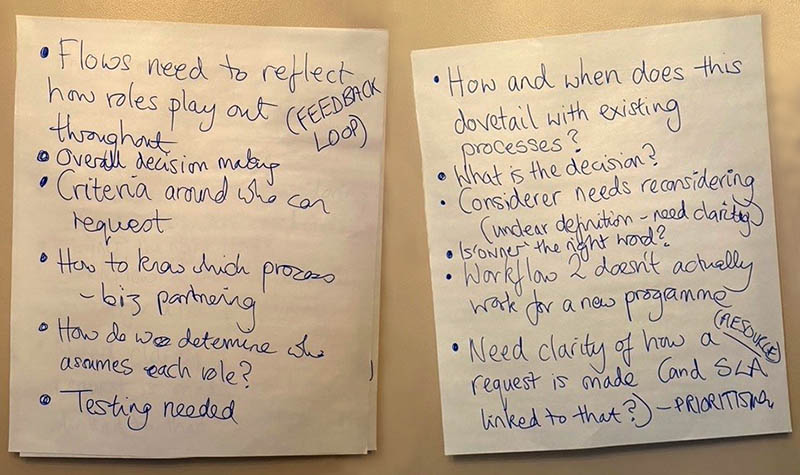We’ve had a series of engagement meetings about who is going to control information in a new web estate and how we manage that.
It involved a lot of notetaking, scribbling and imagining. It was enlightening and, fingers crossed, it’s also been encouraging. There’s a real collective desire to improve our content processes.

Historically, pretty much anyone could gain editing access to the Sussex website. It was just the way things are done.
But now we need to rethink our governance model and ways of managing information. We need fewer editors with better skills and clearer responsibilities, rather than 500 people editing their own small section once in a while.
One clear way to do this is by centralising more of our website management, so we have better governance. But this is not a palatable concept, because it’s absolutely about control of content.
A case study – the Student Hub
We’ve tried centralising in the past and it’s been very difficult, partly because you’re trying to instigate a cultural change and partly because of the “uniqueness” of Sussex.
The Student Hub (a project started in 2018) was partly successful in centralising website content for current students, rending it from the internal structures to which it was hitherto inextricably linked.
We tried bringing everyone along, explaining the purpose of what we were doing and why.
Over time, it became clear that the only way we were going to truly finish populating the student sub-domain, and centralising the governance of this content along the way, was by stealth. Through the back door. There were a lot of emotions tied up with the content we were trying to migrate.
The Student Hub project is now more or less done (more or less informally, because the budget was about 50 quid’s worth of vouchers for some user testing and some digestive biscuits from Asda). There’s always more we can do, but that will now be part of the New Web Estate project.
In the process of working on the Student Hub, up until last year, we had managed to:
- reduce the number of web pages for the current student audience from at least 1,155 down to about 340 – a reduction of approximately 70%;
- remove about 200 website editors from our system and instead have 15 editors networking on a Teams chat
- retire old parts of our website that were largely managed by devolved student services, structured according to the organisation;
- generally increase sessions and users to the Student Hub year-on-year;
- increase visits from Google search to the Student Hub year-on-year (pertinently, by 24% over 2021-2022, and by 30% over 2022-2023).
You’ll notice the majority of the work was about removing and deleting stuff, rather than creating through action bias.
How this phase ended
Cool story. So does this mean we won?
Unbeknownst to me at the time, the drive from senior people to complete the work had evaporated, because of other priorities.
Yet neither had we been told to stop. So we kept on going until the job was done. In the end, we deployed the last sections without sign-off just to get it over the line.
We did win, kind-of. But really the question is: Did users win?
Did students win? Did they get all their information in one place?
Our work was at the expense of some internal relationships. We had not won together.
A second chance
This time round, as part of the NWE project, it will be different.
We will win together – and not just as a department, or a division, or as a collective of professional service staff.
We will win as a university, across professional services and academia, across the third space, across our student body, across our wider community, across all site users.
And we’ll do it through more engagement meetings, more discussions about control and autonomy, more debates about academic freedom and more relationships with people we didn’t get close enough to the first time round.
I can say this with certainty because, this time round, if we don’t win together, we will definitely lose together.


Leave a Reply